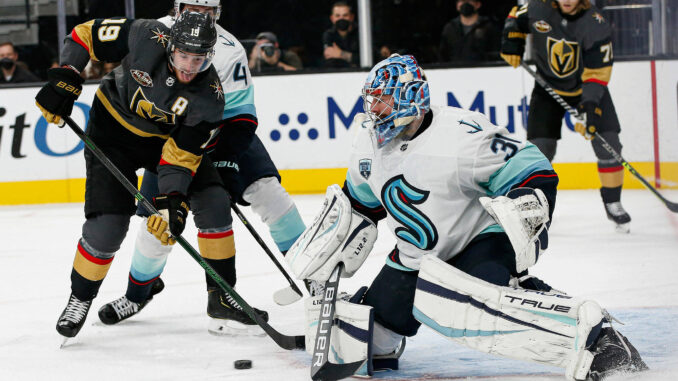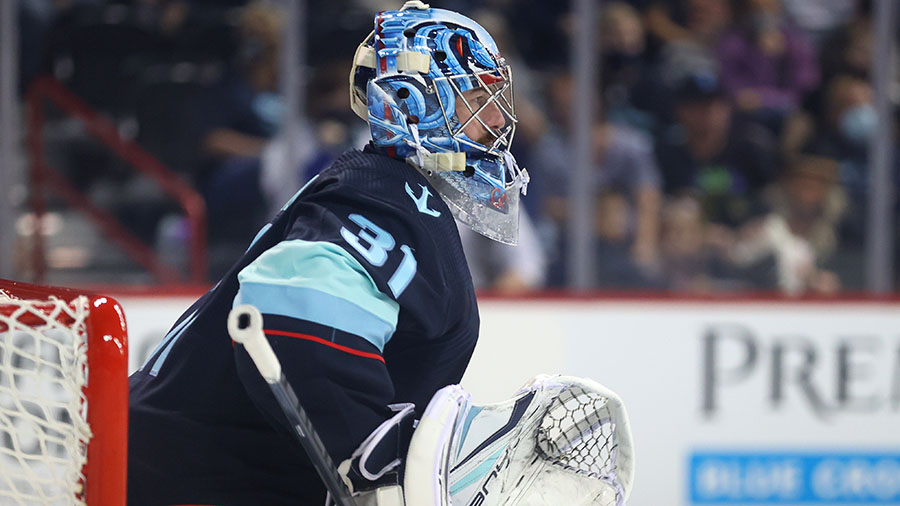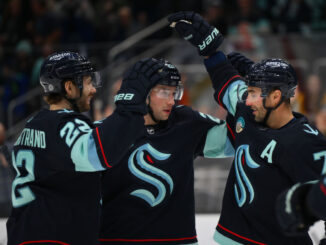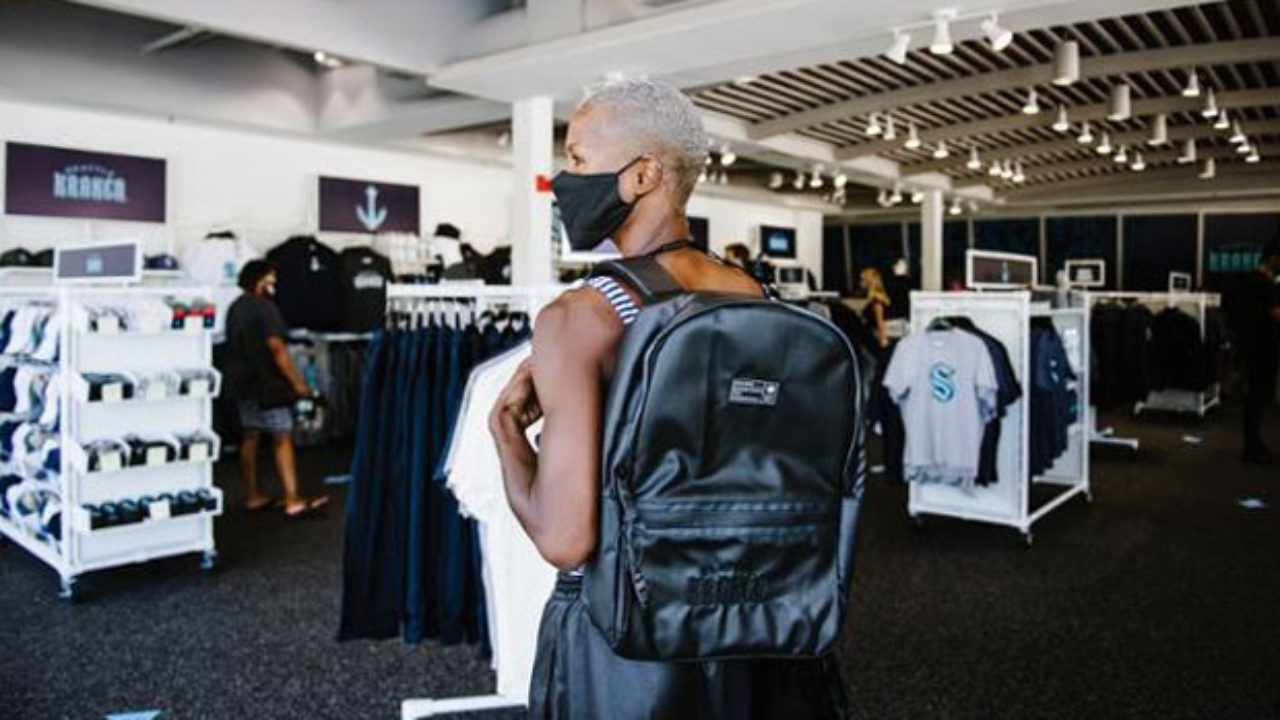
Considering the woeful history of NHL expansion teams, it should not come as a surprise that the Seattle Kraken are channeling their predecessors. The Kraken are the sheepish holders of a 3-6-1 record through the first ten games of their inaugural season, putting them 28th league-wide and at the bottom of the Pacific Division. While being mindful that it’s very early in the campaign and that the players are still establishing chemistry with their new teammates, here are three of the most significant factors driving Seattle’s slow start to the 2021-22 season.
1. Unexpectedly Poor Goaltending
Heading into the season, goaltending was highlighted as one of the Kraken’s strengths. Any potential success for a team bereft of legitimate scoring threats would have to be derived from a cohesive defensive structure and impenetrable net-minding.
Seattle’s goalie tandem of Phillip Grubauer and Chris Driedger were two of the NHL’s best in 2020-21. Grubauer finished with a record of 30-9-1 behind the juggernaut Colorado Avalanche with a save percentage (SV%) of .922, earning him a Vezina Trophy nomination for his efforts. In Florida, Driedger was called upon in relief from Sergei Bobrovsky’s flailing and singlehandedly dragged the Panthers to a playoff spot on the back of his .927 SV% and 2.07 goals-against average (GAA). This season, the pair – along with third-stringer Joey Accord – have been far from their best.

As a collective unit, the Kraken goalies rank fourth-last in all-situations SV% (.885), with none of the three saving over 90% of the shots they’ve faced. With Driedger sidelined through injury, Grubauer is the primary option, playing in eight of the team’s ten games thus far. The immense workload may be taking its toll, as Grubauer has allowed the sixth-most goals-above-expected according to MoneyPuck.
As Seattle made a sizeable contract commitment to the gigantic German-born goalie this offseason, his early results are a cause for concern. However, because his career SV% is .920, and the Kraken are a top-half team in terms of chance quality allowed, I’d bet he returns to something resembling his Vezina form sooner than later. If not, Seattle fans should get to know Shane Wright, the potential first-overall pick in the 2022 NHL Entry Draft, as winning the draft lottery becomes more of a reality than claiming a first-ever playoff spot.
2. Ice-cold Power Play
Although most hockey games are spent at five-on-five, special teams are a key component in driving team success. Running a red-hot power play or throwing out a sturdy penalty kill can overcome deficiencies at even-strength – just ask the Edmonton Oilers. Unfortunately for the Kraken, their power-play units are currently shooting blanks.
The issues are twofold: Seattle is simply not finishing the chances they do get, and their underlying metrics suggest that they’re not creating enough good looks to begin with. The tangible results speak for themselves, as the team has scored on only three of 29 power-play opportunities, a conversion rate of only 10.3% – third-worst in the NHL.
In terms of generating shots in prime areas, the Kraken are falling flat. Their rates of creating scoring chances (16th in NHL) and cumulative chance quality based on expected goals (24th) are middling. It’s not a discussion around quality versus quantity – they’re not getting either. At least the Kraken penalty kill is finding success in thwarting 90% of their opponents’ power-plays, tied for the third-most efficient rate in the league.
3. Lack Of Scoring
Seattle’s overall lack of scoring (22nd in goals-per-game) and their miserable power play are both intimately tied to their roster personnel. Given that the expansion draft rules forced the Kraken to pick players from the margins of other teams’ lineups, it’s unsurprising that they lack firepower. They have four players who have ever scored more than 20 goals in a season and only one (Jordan Eberle) who has surpassed 30 tallies.
Beyond the actual scoring of goals, the team is struggling to consistently fashion dangerous opportunities at five-on-five. They don’t pepper opposing net-minders with shots or create scoring chances with any regularity, posting bottom-half rates in both departments. Most of their primary options played alongside more talented linemates who could drive possession and facilitate offense (Eberle with Mat Barzal; Jaden Schwartz with Ryan O’Reilly or Vladimir Tarasenko). In Seattle, no such star exists as they abide by an ethos of scoring by committee.
Related: Seattle Kraken’s McCann Shines In Expanded Role
Although a higher-than-usual shooting percentage (SH%) can indicate that a team is riding high off of an unsustainable hot streak, it can also show whether its players are above-average finishers. The Kraken ranks 19th in SH% (8.9%), while the league average benchmark is 9.2%. While a few percentage points don’t have too much short-term impact, it could represent the difference between scoring crucial goals in a playoff hunt and camping out in the league’s basement.
Again, it’s early, and the organization has already experienced some form of the injury bug, so chemistry has yet to be formed by players occupying primary scoring roles. However, if the same trends continue into the new year, it might be time for a trade to bring in more offensive pieces. When Brandon Tanev (six goals) is your leading scorer, there’s a problem.
Where Do the Kraken Go From Here?
The volatility of a limited, early-season sample suggests that it’s not time to pit’s just yet—much of the Kraken’s poor resuKraken’sbeing driven by unfavorable puck luck and poor conversion on offense. Once the percentages regress to the norm, the team should start accumulating points in the standings and make a late dash for the playoffs. No matter what, it’s shaping up to be an exciting season for the NHL’s newest francNHL’s- only time will tell if it ends up being a success.
Data courtesy of Hockey Reference, MoneyPuck, and Natural Stat Trick.




